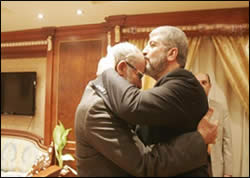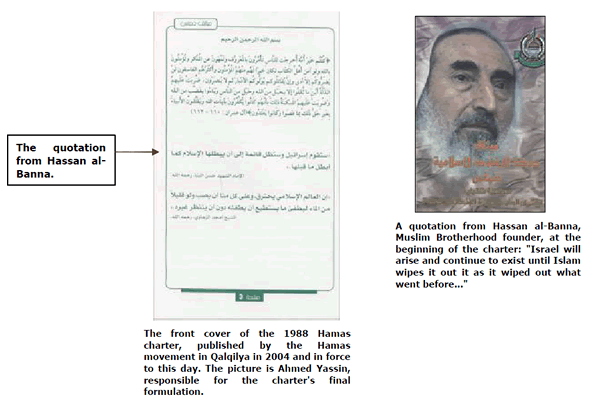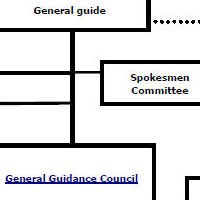![]()
Mon, Dec 26, 2011 | A study by The Meir Amit Intelligence and Terrorism Information Center

The emblem of the Muslim Brotherhood in Jordan. The white circle is imprinted with the movement's militant motto: Allah is our objective, the prophet (Muhammad) is our leader, the Qur'an is our law, jihad is our way, death for the sake of Allah is our most exalted aspiration." Despite it belligerent motto, the Muslim Brotherhood in Jordan has shown a great degree of pragmatism and has been an opposition the Hashemite regime can tolerate, so far even after the regional uprisings.
The Muslim Brotherhood in the Arab World and Islamic Communities in Western Europe[1]
The Muslim Brotherhood is an Islamic mass movement whose worldview is based on the belief that “Islam is the solution” and on the stated aim of establishing a world order (a caliphate) based on Islamic religious law (Shariah) on the ruins of Western liberalism. With extensive support networks in Arab countries and, to a lesser extent, in the West, the movement views the recent events in Egypt as a historic opportunity. It strives to take advantage of the democratic process and recent elections for gradual, non-violent progress towards the establishment of political dominance and the eventual assumption of power in Egypt and other Middle Eastern countries.
Overview
General Remarks
This study updates and supplements the ITIC’s June 2011 study of the Muslim Brotherhood. It examines the Muslim Brotherhood in Egypt and other Arab countries in the wake of the past year’s regional uprisings. It deals with the nature of the movement in each country, its relations with the various regimes and evaluates its chances of exploiting regional unrest to its own ends. It also examines the Muslim Brotherhood’s branches in Western European countries and the implications of its activity for both internal European affairs and the Palestinian-Israeli conflict.
In the various Arab countries, the behavior of the Muslim Brotherhood has been influenced by the basic tension between the movement’s ultimate goal of establishing a state run according to Islamic law (Sharia’h) and the need to exhibit a certain degree of pragmatism and flexibility in relation to the movement’s need to adapt itself to the social and political conditions of each country. Thus it cannot be regarded as uniform throughout the Arab world for it is run differently in each country, according to local circumstances and constraints. However, there are connections and common learning within the movement in Egypt and other countries in the Middle East and around the globe.
The Muslim Brotherhood’s ideology is based on the worldview of “Islam as the solution” for every individual, social and political problem. Instituting a comprehensive “Muslim world order” will be possible, according to the movement and its founders, by means of a long-term process of multiple stages. It will, through education, begin with the new Muslim individual, progress to his family, from his family to society at large and from there to the new Muslim world order. Attaining political power includes winning elections and forming a state run according to Islamic law, the liberation of countries of Islam from a foreign yoke, uniting them into one Islamic entity, and spreading Islamic values around the globe on the ruins of the liberal West. How to implement the ideology is subject to broad interpretation, and there are pragmatic, conservative and extremist factions within the movement.
The Muslim Brotherhood is the most well-organized political force in Egypt today. It also has a broad socio-economic system (the da’wah), built up over the years as a function of the movement’s fundamental ideology. Once Mubarak’s regime was overthrown, the Muslim Brotherhood found itself in a forward position from which to attain power than for others who participated in the protests in Tahrir Square, as can be seen by its success in two of the three election rounds for the People’s Assembly.
The Muslim Brotherhood in Egypt
The Muslim Brotherhood was founded in Egypt by Hassan al-Banna in the early 20th century. Over the years it grew to become the biggest and best-established of the Muslim Brotherhood movements in the Middle East and beyond, and one of the central movements of political Islam.
The success of the Muslim Brotherhood in Egypt is rooted in a combination of ideology, politics and social work. Ideologically, it is perceived as an authentic response to the hegemony of “Western occupation,” and attracted its following from among people who had been disappointed by other ideologies. It also found a foothold in the educated urban middle class using its vast socio-economic system, the da’wah, to win the battle for hearts and minds. It focused on responding to the problems of the ordinary man in the street through its broad social welfare programs, which included education and health care, along with preaching in its network of mosques. They often supplanted dysfunctional state institutions and became an effective social network for the dissemination of the Muslim Brotherhood’s religious and political ideas.
The Muslim Brotherhood in Egypt is hostile to Israel because of its fundamental ideology. The movement regards all the land of Palestine as an Islamic endowment (waqf), rejects the State of Israel’s right to exist, promotes an uncompromising jihad against Israel, and absolutely rejects peace treaties and normalization with Israel. In addition, it is consistently anti-Semitic and spreads anti-Semitism, either rooted in Islam or based on The Protocols of the Elders of Zion. Publicly, however, it sometimes represents itself as moderate and pragmatic because it considers its image in the international community as important.
The Muslim Brotherhood opposes Al-Qaeda’s global terrorism, but supports violent actions carried out by Islamic networks against the Western “occupations” of Iraq, Afghanistan and elsewhere. As for the use of terrorism in the Palestinian-Israeli conflict, it support terrorism as employed by Hamas, its Palestinian branch. Both inside and outside Egypt, the Muslim Brotherhood maintains close relations with Hamas and provides it with political, propaganda and financial support.
The Muslim Brotherhood is not monolithic, it has pragmatic and moderate elements, including those which genuinely seek to combine pragmatism, real democracy and political tolerance with Islam. However, in our assessment, the combined weight of those elements, at least at this stage, is less than that of the more conservative and radical elements. That can clearly be seen by the appointment of conservative Mohammed Badie to the highest position of General Guide.
After Mubarak was overthrown, the Muslim Brotherhood, which had been outlawed by his regime, became a legitimate political force and the best organized one in the country. It won a sweeping victory in the first two of three rounds of elections for seats in the People’s Assembly (the lower house in the Egyptian parliament): according to the reports, the Muslim Brotherhood-backed Freedom and Justice party won 40% of the votes in the first round and 47% in the second. The Salafist El-Nour party, with its rigid, radical, ultra-conservative ideology, won 20% of both the first and second rounds. On the other hand, the liberal parties which participated in the protests in Tahrir Square were roundly defeated.
The Muslim Brotherhood’s success in the elections may present it with a dilemma, whether to unite with the Salafist parties or not. In our assessment, at this stage the movement might find it preferable to dissociated themselves from Salafists, despite its victory at the polls. It might preserve its moderate front, attempt to form a coalition with the secular parties and collaborate tactically with the army to create checks and balances and share power within government institutions. It would do that without losing sight of its long-term goals by relying on its strength in parliament, which would allow it to influence the nature of the constitution and use that in turn to influence relations between religion and state and the status of the army in the governmental system.
The Muslim Brotherhood in Other Arab Countries
By the 1930s and ’40s branches of the Muslim Brotherhood were being formed in other countries in the Arab world. One of the most prominent was in Syria, at the time considered second in size only to the Egyptian branch. Branches were founded and grew in Jordan, Algeria, Sudan, Morocco, Saudi Arabia, Tunisia and the Gulf States; Hamas was established as the branch of the Muslim Brotherhood in the Palestinian arena. An analysis of how the movement operates in those countries and what the relations are between its branches and the regimes shows that they vary from country to country and are influenced by and adapt to local societal and politician conditions, including national, sectarian, and religious conditions.
Following its worldview, which stresses all-pervading societal changes, and in view of the strict line it takes against the various regimes, in most of the Arab states the Muslim Brotherhood has focused on constructing its social infrastructure (the da’wah) and winning the battle for hearts and minds, demonstrating a considerable degree of pragmatism and the willingness to restrain itself in the face of persecution to ensure its long-term survival. In several countries it has integrated into political institutions, in most cases as a tolerated opposition and in others even as a collaborator in joint political challenges. In two exceptional cases, Syria and the Palestinian Authority, the Muslim Brotherhood and Hamas (the Palestinian branch of the Muslim Brotherhood) were involved in violent actions against the regime. In Syria in 1982 that involvement failed, while in the Palestinian Authority in 2007 Hamas was successful and took control of the Gaza Strip.
In Jordan, for example, the Muslim Brotherhood was not traditionally a significant opposition force and did not seriously threaten the Hashemite regime, and at various times was even included in the governmental system. In Sudan the movement has enjoyed periods of incorporation into the government and wielding political influence as well as periods of persecution and oppression. In Algeria the movement eventually became part of the government of President Bouteflika. In Saudi Arabia the regime gave Muslim Brotherhood activists political asylum but has reservations about it. In Qatar the movement has government support and in Kuwait they have been incorporated into the parliament. In Tunisia the Al-Nahda party, affiliated with the Muslim Brotherhood, was persecuted by the government until it won the elections after the Jasmine Revolution.
In Syria, on the other hand, the Muslim Brotherhood headed the 1982 uprising against the Hafez al-Assad regime, which broke out in the Syrian town of Hama and was brutally suppressed. The movement was subsequently outlawed and for the most part continued its activities outside Syria. Today it participates in the uprising against Bashar Assad, part of a broad coalition of opponents to his regime. In the Palestinian Authority Hamas, the Palestinian branch of the Muslim Brotherhood, participated in the 2006 Palestinian Legislative Council elections, but later, in June 2007, it a series of violent military maneuvers it overthrew Fatah and the Palestinian Authority and took political and security control of the Gaza Strip. To this day, the case of the Gaza Strip is an exceptional example of the establishment of a governmental entity by a movement affiliated with the Muslim Brotherhood which took power by means of a military coup d’état.
As a precautionary measure to avoid administrative responsibility and involvement in daily politics, in most of the Arab states the Muslim Brotherhood has established political parties affiliated with it as a front for their political activities: In the recent elections in Egypt the movement operated through the Freedom and Justice party; in Jordan it established the Islamic Action Front; in Algeria it established the Movement for the Society of Peace; in Sudan it established the Islamic Charter Front and later the National Islamic Front; in Lebanon it is affiliated with an organization called Al-Jamaa al-Islamiya; in Morocco with the Moroccan Justice and Growth party; in Tunisia with the Al-Nahda party, which was persecuted by the authorities until the Jasmine Revolution, after which it won the elections and is now the country’s main political power; and in Kuwait it established the Islamic Constitution Movement. In Saudi Arabia the Muslim Brotherhood was not permitted to establish a political party. In Syria the movement preserved its identity as the Muslim Brotherhood, but this past year its leader expressed his readiness to turn it into a political party.
The Muslim Brotherhood in the Wake of the Regional Uprisings
While the Muslim Brotherhood did not play a dominant or central role in the dramatic events which rocked the Arab world throughout 2011, it would seem to have profited most from the changes which occurred in several Arab countries. It would seem that the various Muslim Brotherhood movements exploited the historic moment to translate their social strength into significant political power, while keeping a low profile. Their tactics are currently circumspect, they play down or hide their extremist ideology, present a moderate face to the Western world, are politically correct with the media and join other protest groups whose ideologies are different from theirs.
In certain instances, the movement has joined a broader coalition of political or social opposition forces, along with groups of young or left-leaning liberals who participated in the protests. However, later on, if and when the protests mature into significant socio-political changes, the Muslim Brotherhood may abandon its current discretion and will not hesitate to confront its protest partners. Under such conditions it will attempt to become a legitimate political force, widely visible, seeking to impose its Islamist agenda and become the dominant force among the regimes and societies in the various Arab states.
In some of the Arab states, following the regional uprisings, the Muslim Brotherhood is undergoing the transition from persecuted or tolerated opposition movement to an important political force which may become an active partner in the newly-forming political systems. There are signs in several countries that the process has already begun. In Egypt the Muslim Brotherhood had turned into an important, legitimate political force and won two of the first three rounds for seats in the parliament (40% of the seats in the first round and 47% in the second, as noted above). In Tunisia the Al-Nahda party, whose activity had previously been forbidden, has, after winning 40% of the parliamentary votes, become a major political force. In Morocco the Justice and Development party won the largest number of seats in the parliamentary election, 107 of 395, or 27%, and became the major opposition party. In other Arab countries, where the struggle is still going on, the Muslim Brotherhood has joined protest groups, both those seeking to overthrow the regime and completely change the political system, such as Syria, and at this stage those seeking to change the system from within, such as Jordan.
The recent regional uprisings have also influenced the Palestinian arena: Hamas and the Muslim Brotherhood in Egypt have publicly grown closer and strengthened their ties. Throughout 2011 the Hamas leadership in the Gaza Strip met with high-ranking Muslim Brotherhood officials in Cairo, which Hamas regards as a way of obtaining leverage with the Egyptian army and government as well as improving its position with regard to Fatah and the Arab world.[2] Another example of the influence of the regional uprisings is the ongoing Hamas exodus from Damascus and its leadership’s removal to other locations.[3]

Khaled Mashaal (right), head of Hamas' political bureau, and Mohammed Badie, the Muslim Brotherhood's General Guide, meet in Cairo, August 10, 2011 (Janobiyat.com website)
The Muslim Brotherhood in Europe
The main catalyst for the expansion of the Muslim Brotherhood beyond the borders of Egypt, including to Europe, was Egyptian President Nasser’s suppression of the movement in 1954. Large, well organized groups of Muslim Brotherhood members fled in the 1950s to Saudi Arabia and Qatar. A third, less cohesive group, fled to the United States and various European countries, especially West Germany. Today the movement claims it has a presence in more than 80 countries around the globe.[4]
In Germany the movement first took root in local Muslim communities and then spread to university campuses and among leftists members of the opposition. In the following decades it gradually established itself in other European countries and spread radical Islam to the West and became, in effect, the representative of the Muslim immigrant communities. It is noteworthy that the various organizations, networks and activists in Europe are generally careful to deny their affiliation to the movement, especially after the events of September 11, 2001.
With the financial support of the Gulf States (which continues to this day) the Muslim Brotherhood extended the da’wah network in Europe and the United States by establishing banks, mosques, research centers, Islam facilities, and social and educational institutions. They all disseminate the movement’s radical political Islam to the local Muslim communities. The most prominent centers in Europe with direct or indirect ties to the Muslim Brotherhood are in Britain, Germany (especially Munich[5]) and France, and include the German Islamic Society (Islamische Gemeinschaft Deutschlands, IGD), the British Union of Islamic Organizations and the Muslim Association of Britain (MAB).
The Muslim Brotherhood seeks to turn Islam into the dominant force on the Continent within Europe’s multicultural society, as part of the overall vision of the Islamic world conquest. In the past, Yousef al-Qardawi, a senior Sunni Muslim authority affiliated with the Muslim Brotherhood, reiterated his faith that Islam would eventually take over Europe although, he said, but not by war.[6] He said, “This means that Islam will return to Europe as a conqueror and victor, after having been expelled from it twice,” qualifying his statement by saying, “I maintain that the conquest this time will not be by the sword but by preaching and ideology.”[7]
The same theme appeared in Risalat al-Ikhwan, the Muslim Brotherhood organ printed in Britain, whose front cover showed a map of the world with a quotation from movement founder Hassan al-Banna underneath reading “Our mission is to rule the world,” but later, apparently as of 2003, the words “is to rule the world” were removed, in our assessment, because the Muslim Brotherhood was afraid of possible legal issues after September 11, 2001.
The Position of Muslim Brotherhood in Europe on Terrorism
The Muslim Brotherhood opposes Al-Qaeda’s ideology and its activists do not directly involve themselves in terrorist attacks against Western countries or Israel. The movement also opposes radical Shi’ite Islam as spread by Iran. Therefore, generally speaking, the European countries do not regard the Muslim Brotherhood as a security risk and thus allow them to operate within the Muslim communities. Their position is completely different for networks belonging to Al-Qaeda and the global jihad, which are targeted by the security services of various Western countries.
However, the movement disseminates toxic propaganda against the West and its values, helping to segregate the Muslim population from local society. The constant preaching makes it hard for the various Muslim communities to mingle with the indigenous societies in the countries in which they live and to internalize and West’s liberal, democratic values. Moreover, young people throughout Europe who have been exposed to the movement’s radical Islamic ideology form a potential reservoir from which global jihad networks can recruit operatives (jihadization). Thus, in recent years there has been a rise in the number of terrorists with Western citizenship who at some point in their lives were educated in institutions affiliated with the Muslim Brotherhood’s da’wah or who underwent radical Islamization through the Internet, until they eventually abandoned the basic ideology of the Muslim Brotherhood and turned to the way of the global jihad.
The Position of Muslim Brotherhood in Europe on Israel
The Muslim Brotherhood in Europe (as well as in the Arab countries) is fundamentally hostile to Israel, rejects its right to exist, supports Hamas, denies the legitimacy of the Palestinian Authority, rejects the peace process and Israeli-Palestinian negotiations and rejects any and all signs of normalization between Israel and the Arab states (especially Egypt and Jordan). The branches of the Muslim Brotherhood in Europe adapt the movement’s fundamental ideology, according to which Palestine [including the State of Israel] is land belonging to the Muslim endowment (waqf) and an Islamic Palestinian state has to be built on it, to which the refugees who left in 1948 will return within the framework of the so-called “right of return.”
The Muslim Brotherhood in Europe plays a key role in the campaign being waged to delegitimize Israel and seeks to spread its basic positions to the European public, sometimes in a softened form by using catchwords familiar and acceptable to Western ears. It participates in anti-Israeli and pro-Hamas propaganda projects (such as flotillas and convoys to the Gaza Strip), is involved in anti-Israeli propaganda activities in various countries and participates in the BDS campaign to boycott Israel, its products, its culture and its leaders. In addition, it plays an important role in collecting money for Hamas through its participation in the Union of Good, a network of funds and foundations around the world headed by Sheikh Yousef al-Qardawi.
The Muslim Brotherhood conducts its anti-Israeli activities in collaboration with extreme leftist networks and activists hostile to Israel (called by the media the “red-green alliance”), and with human rights and social organizations. At the same time, activists belonging to Islamic networks in Europe affiliated with the Muslim Brotherhood maintain ongoing relations with other branches and with the movement’s leaders in the Middle East, especially Yousef al-Qardawi, who lives in Qatar, and the Muslim Brotherhood leadership in Egypt.
The Structure of This Study
The study includes the following sections:
1. Overview
2. The Muslim Brotherhood in the Arab countries
a) Egypt
b) Syria
c) Jordan
d) Algeria
e) Sudan
f) Saudi Arabia
h) Lebanon
i) Morocco
j) Tunisia
3. The Muslim Brotherhood in Europe
a) Establishing the Muslim Brotherhood
b) The Muslim Brotherhood’s umbrella networks
c) Muslim Brotherhood activity in Turkey
d) Britain as a center for Muslim Brotherhood activity
e) London as the Muslim Brotherhood’s media center
Notes:
[1] Supplement and update for the June 19, 2011 ITIC study of the Muslim Brotherhood.
[2] For further information see the November 20, 2011 bulletin “A high-level delegation of Egypt’s Muslim Brotherhood recently held a first-of-its-kind visit to the Gaza Strip, following up on meetings with top Hamas officials held in Cairo…”
[3] For further information see the December 11, 2011 bulletin “Hamas evacuates its Syrian external headquarters: overview and initial analysis.”
[4] Udi Rosen, “Mapping the Organizational Sources of the Global Delegitimization Campaign against Israel in the UK,” website of the Jerusalem Center for Public Affairs, 2010, page 12.
[5] For a long time the center the Muslim Brotherhood’s activities was in Munich.
[6] Udi Rosen, “Mapping the Organizational Sources.”
[7] MEMRI, December 6, 2002, Special Dispatch 447, http://www.memri.org/report/en/0/0/0/0/0/0/774.htm.



 RSS
RSS












The Muslim Brotherhood in the Arab World and Islamic Communities in Western Europe | Middle East, Is http://t.co/EfOZXlTC
The Muslim Brotherhood in the Arab World and Islamic Communities in Western Europe | Middle East, Is http://t.co/EfOZXlTC